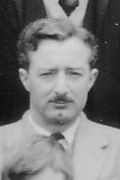 1956 |
John WebsterTeacher: 1948 - 1956 |
|
Extract from The Times Obituary, 11th January, 2016.
John Webster, MC, soldier and headmaster. John Webster was born in Prescot, Lancashire, the son of William and Ellen Webster, and attended Prescot Grammar School, from where he was awarded a scholarship to study English at Edinburgh University. Instead, after the outbreak of war, he enlisted and was commissioned into the Royal Scots in 1940. At the end of hostilities in Europe, he was offered a regular commission, but also a place at Queens' College, Cambridge, to read English, which he accepted. After graduation in 1947, he taught English at Holt High School in Liverpool before becoming head of English at the Liverpool Institute, where his students included George Harrison and Paul McCartney. In 1956, Webster was appointed head of Gillingham grammar school and charged with merging it with the adjacent secondary modern school to create the first comprehensive in North Dorset. This was achieved in 1959. It became known as the "Gillingham model", which was a blueprint for many such amalgamations across the country. He had a firm belief in equality of educational opportunity and Gillingham lent itself to the comprehensive system. A conventional and strict headmaster, Webster clamped down hard on poor or distracting behaviour that diminished scholastic achievement. His daughter, Fiona, remembers being given 100 lines for some classroom misdemeanour in the first year that she attended Gillingham. She too became an English teacher before being appointed head of drama at King Edward VI Grammar School in Louth, and is now a professional watercolourist. Her elder brother, Professor Roger Webster, was until recently dean of faculty at Liverpool John Moore's university, while her younger brother, Neil, is a senior researcher at the Danish Institute for International Studies in Copenhagen. Webster had married Lesley Airey, who served in the Wrens as a signals rating during the war, in 1948. She predeceased him. He served as chairman of the Southern Region Examinations Board in the 1970s and 1980s and was a key figure in merging GCE O levels with CSEs to create the GCSE qualification. During the 1970s, he was seconded for six months to Exeter University to take part in a research project into sixth-form education. In sharp contrast to the stern and demanding personality he presented as a headmaster, he was a loving and amusing husband and father. The children's friends, responding to invitations to the house, would arrive scrubbed, tidy and in a state of trepidation, only to be amazed by the relaxed and entertaining father figure who kept them in fits of laughter during their visit. He enjoyed walking in the Lake District, playing badminton and tennis, a good malt whisky and Wadworth's 6X beer. He was fascinated by clocks and would always offer to mend one that had stopped. He spoke to his family only seldom about his wartime experiences, but on New Year's Eve he would don his Royal Scots tunic, improvise a kilt with a tablecloth and march round the house with a kitchen chair representing the bagpipes as he hummed his personal rendering of a medley of tunes, including the quick march of the Royal Scots Dumbarton's Drums. The week he died, he was appointed Chevalier of the Legion d'honneur by the French government in recognition of his wartime service. Asked in old age about his reaction to entering Belsen in 1945, he replied: "To see human beings reduced to this state, and to think that other human beings had done this to them, well, I still try to make sense of it. What did it mean? You can't explain the inexplicable." |
||

|
Liverpool Institute High School for BoysMount Street, Liverpool. (1825-1985) |
|